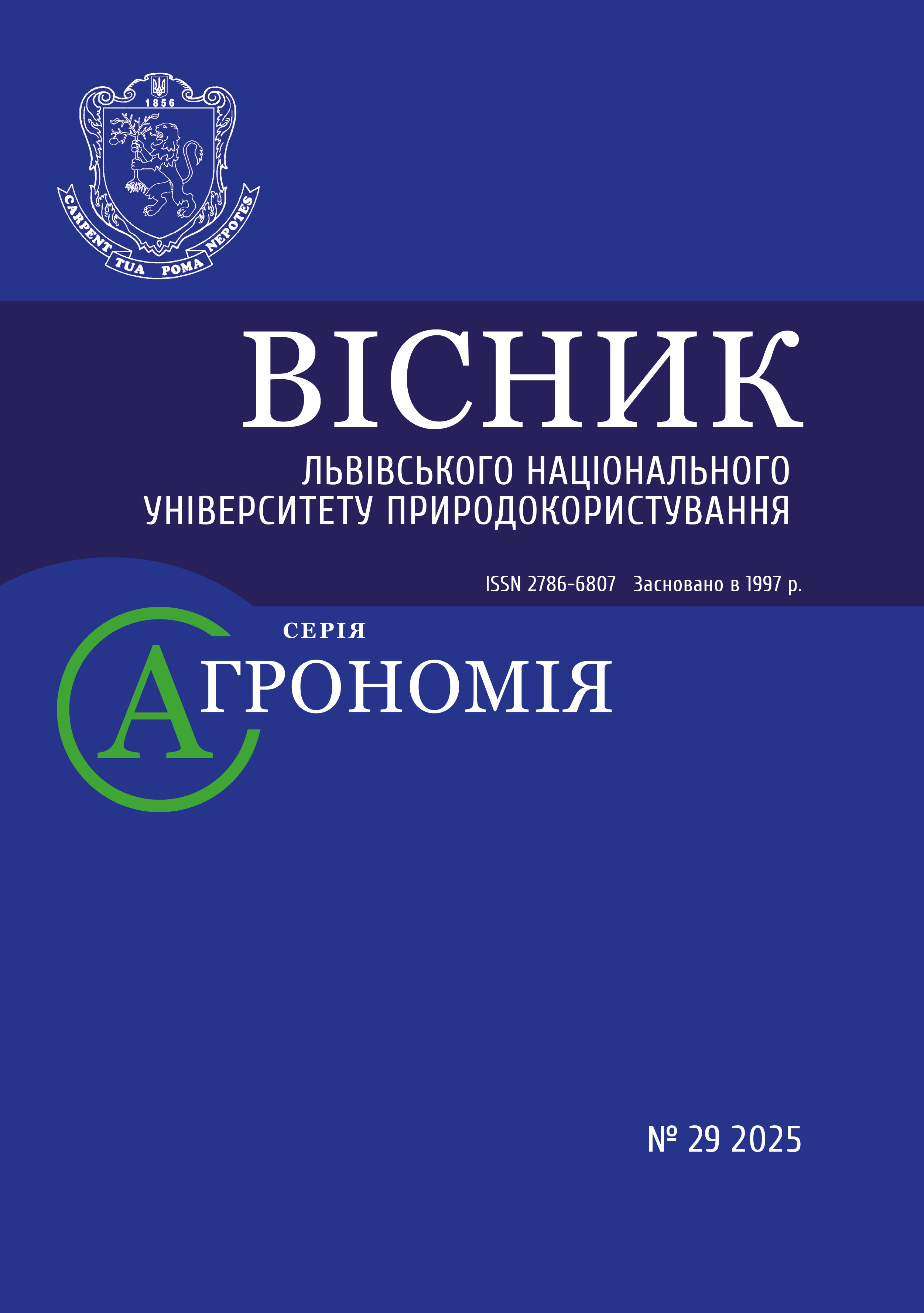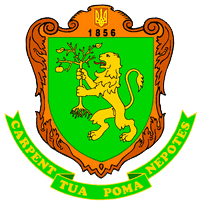ЕФЕКТИВНІСТЬ ВИКОРИСТАННЯ ІНСЕКТИЦИДІВ ДЛЯ ЗАХИСТУ КАРТОПЛІ ВІД КОЛОРАДСЬКОГО ЖУКА
DOI:
https://doi.org/10.31734/agronomy2025.29.152Ключові слова:
картопля, шкідники, колорадський жук, інсектицидні препарати, захист картоплі, урожай бульбАнотація
Досліджено ефективність застосування інсектицидів для захисту посівів картоплі від колорадського жука на дослідному полі кафедри генетики, селекції та захисту рослин Львівського національного університету природокористування (зона західного Лісостепу України) впродовж 2022–2023 років. Використано три препарати: Кораген 20 %, концентрат суспензії, в нормі 60 мл/га, Конфідор Максі 70 %, водорозчинні гранули у нормі 50 г/га, системний інсектицид Актара 25 %, гранули водорозчинні у нормі 60 г/га, контроль – без обприскування інсектицидами. Дослідження проводили на чотирьох сортах картоплі різних груп стиглості, які занесено до Державного реєстру сортів рослин України: Беллароза (ранньостиглий), Водограй (середньоранній), Воля (середньостиглий) та Західна (середньопізній).Встановлено високу технічну ефективність інсектицидів нового покоління Конфідор Максі 70 % (на рівні 88,2–89,4 %) та Кораген 20 % (78,2–81,2 %) незалежно від сорту картоплі. Згідно із експериментальними даними, рівень урожаю картоплі залежав як від біологічних особливостей конкретного сорту, так і від виду інсектициду, застосованого для захисту посівів від пошкодження колорадським жуком. У середньому за два роки найвищий урожай бульб сформували сорти картоплі за використання системного інсектициду Конфідор максі 70 %, а саме: Беллароза – 29,1 т/га, Водограй – 30,4; Воля – 33,8 та Західна – 30,9 т/га. За використання інсектициду Актара 25 %, в.г. урожайність бульб була значно нижчою: 25,6 т/га (Беллароза), 26,9 (Водограй), 28,6 (Воля) та 27,5 т/га (Західна). При цьому урожай у контрольному варіанті становив відповідно 8,6; 11,5; 12,5 та 11,9 т/га.
Для захисту посівів картоплі від пошкодження колорадським жуком у зоні Західного Лісостепу пропонується застосовувати інсектициди Конфідор Максі 70 % у нормі 50 г/га та Кораген 20 % у нормі 60 мл/га. З метою уникнення можливої резистентності фітофага до цих препаратів пропонується чергувати використання інсектицидів, а також використовувати їх у баковій суміші із рекомендованими фунгіцидами.
Посилання
Alyokhin A. Colorado potato beetle management on potatoes: Current challenges and future prospects. Fruit Veg. Cereal Sci. Biotechnol. 2009. 3. Р. 10–19.
Alyokhin A., Baker M., Mota-Sanchez D., Dively G., Grafius E. Colorado Potato Beetle Resistance to Insecticides. American Journal of Potato Research. 2008. 85 (6). Р. 395–413.
Astakhov O. O., Lasun O. V. Modern methods of control of potato phytophages. Scientific Bulletin of NULES of Ukraine. 2021. No 15. P. 90–98.
Boiko Yu. V. Colorado potato beetle (Leptinotarsa decemlineata Say.) and assessment of resistance of regional potato varieties to its damage under conditions of the Western Forest-Steppe of Ukraine. Scientific Collection: Bulletin of the Steppe. Kirovohrad: “KOD”. 2010. Issue 7. P. 154–157.
Boiko Yu. V. Features of intrapopulation polymorphism of the Colorado potato beetle (Leptinotarsa decemlineata Say.) and its resistance to insecticides in the Western Forest-Steppe of Ukraine. Bulletin of Lviv National Agrarian University: Agronomy. 2009. Issue 13. P. 180–185.
Boiko Yu. V., Kokhanets O. M. Influence of potato varieties with different resistance levels on the dynamics of harmfulness of the Colorado potato beetle (Leptinotarsa decemlineata Say.) in the Western Forest-Steppe of Ukraine: materials of the International Scientific and Practical Forum, September 18–21, 2012. Lviv, 2012. P. 42–46.
Bondarieva L., Mishchuk V., Maksymchuk A. History of pesticide use against the Colorado potato beetle in Ukraine. World Journal. 2021. Issue 9, No 1. P. 138–142. URL: https://doi.org/10.30888/2663-5712.2021-09-01-026
Borzykh O. I., Fedorenko V. P. Current problems of the phytosanitary state of agrobiocenoses in Ukraine. Plant Protection and Quarantine. 2016. Issue 62. P. 3–17.
Brechko E. V. Optimization of insecticide application in the protection of potatoes from the Colorado potato beetle. Agronomist. 2012. No 3 (37). P. 148–151.
Burand J. P., Hunter W. B. RNAi: Future in insect management. J. Invertebr. Pathol. 2013. No 112. Р. 68–74.
Buriak O. V., Sokolov M. P. Influence of biological preparations on the number of potato phytophages. Agriculture of Ukraine. 2020. Issue 5. P. 34–39.
Chabaieva A. K. Selection of phytophage control strategies in potato cultivation. Bulletin of Agronomy. 2021. Issue 10. P. 81–90.
Cong W. A. N. G., Han X. U., Pan X. B. Management of Colorado potato beetle in invasive frontier areas. J. Integr. Agric. 2020, 19, 360–366.
Crossley Michael S., Rondon Silvia I., Schoville Sean D. Effects of contemporary agricultural land cover on Colorado potato beetle genetic differentiation in the Columbia Basin and Central Sands. Ecology and Evolution. 2019. 9 (16).
Dudar I., Dudar O., Korpita H. Effectiveness of insecticides in controlling the Colorado potato beetle. Bulletin of Lviv National Agrarian University: Agronomy. 2020. No 24. P. 172–175.
Horbatiuk O. M., Velychko I. V. Strategies of biological control of phytophages. Bulletin of Ecology. 2022. Vol. 40. No 3. P. 78–85.
Khablak S. Biological preparations for plant protection against pests. Agronomist. 2024. No 4. P. 56–58.
Kliot Adi, Ghanim Murad. Fitness costs associated with insecticide resistance. Pest Management Science. 2012. 68 (11). Р. 1431–1437.
Klymenko L. M. Methods of controlling the number of potato phytophages. Bulletin of Agriculture. 2022. Issue 6. P. 40–48.
Leptinotarsa decemlineata, Colorado Potato Beetle: Synonyms. Encyclopedia of Life. 2017.
Lorenzen J. H., Balbyshev N. F., Lafta A. M., Casper H., Tian X., Sagredo B. Resistant potato selections contain leptine and inhibit development of the Colorado potato beetle (Coleoptera: Chrysomelidae). J. Econ. Entomol. 2001. 94. Р. 1260–1267.
Maharijaya A., Vosman B. Managing the Colorado potato beetle; the need for resistance breeding. Euphyticа. 2015. 204. Р. 487–501.
Melnychuk F., Alieksieieva S., Hordiienko O., Melnychuk L. Effectiveness of insecticides against major potato phytophages under sprinkler and drip irrigation. Biological Systems: Theory and Innovation. 2020. Vol. 11, No 3. P. 92–105.
Methods of Testing and Application of Pesticides / S. O. Trybel, D. D. Siharova, M. P. Sekun, O. O. Ivashchenko et al.; edited by Prof. S. O. Trybel. Kyiv: Svit, 2001. 448 p.
Oerke E. C. Crop losses to pests. J. Agric. Sci. 2006. 144. Р. 31–43.
Oliinyk T. M., Podberezko I. M., Koval V. S. Evaluation of potato varieties for field resistance against the Colorado potato beetle. Plant Protection and Quarantine. 2016. Issue 62. P. 306–315.
Radcliffe E. B., Lagnaoui A. Pests and Diseases. In: Vreugdenhil D., Bradshaw J., Gebhardt C., Govers F., Taylor M. A., MacKerron D. K., Ross H. A., editors. Potato Biology and Biotechnology: Advances and Perspectives. 1st ed. Elsevier; Oxford, UK. 2007. Р. 545–554.
Sekun M. P. Problems of integrated pesticide use in plant protection. Bulletin of Agrarian Science. 2002. No 10. P. 24–25.
Sekun M. P., Koshevska N. M. Role of varietal characteristics of host plants in the sensitivity of phytophages to insecticides. Plant Protection and Quarantine. 2001. Issue 47. P. 94–106.
Sekun M. P., Manko O. V. Resistance of harmful arthropods to modern insectoacaricides and ways of formation of resistant populations. Integrated Plant Protection at the Beginning of the 21st Century: materials of the International Scientific and Practical Conference. Kyiv: Koloobih, 2004. P. 294–298.
Serhiienko V. H., Shyta O. V. Application of chemical and biological preparations in the system of potato protection against pests. Quarantine and Plant Protection. 2013. No 10. P. 12–15.
Shyta O. V. Protection of potatoes against major diseases and pests. Quarantine and Plant Protection. 2019. No 1–2 (253). P. 18–20. 33. Shyta O. V. Protection of potatoes against major pests and diseases. Agronomist. 2020. No 4. P. 18–20.
Shyta O. V., Vergeles P. M., Tsurkan R. P. Colorado potato beetle on potato plantings and control of its population under conditions of the Right-Bank Forest-Steppe. Agriculture and Forestry. 2024. No 34. P. 84–91.
Solomiichuk M. P., Kordulian Yu. V. Use of biological protection systems for potatoes against the Colorado potato beetle (Leptinotarsa decemlineata Say.) and late blight (Phytophthora infestans (Mont.) de Bary). Plant Protection and Quarantine. 2018. Issue 64. P. 208–218.
Sytnyk T. L., Chumak V. I. Integrated control of potato phytophages: modern approaches. Agrarian Economics. 2020. Vol. 42, No 3. P. 30–45.
Thomas Ford. Protect Potato Yields by Managing Colorado Potato Beetles. Pennsylvania State University. June 4, 2024. Р. 1–4.
Tkalenko H. M. Biological protection of potatoes from the Colorado potato beetle. Vegetables and Fruits. 2021. No 8. P. 12–18.
Trybel S. O. Once again about the Colorado potato beetle. Quarantine and Plant Protection. 2008. No 8 (146). P. 2–4.
Trybel S. O. Resistant varieties: problems and prospects. Quarantine and Plant Protection. 2005. No 6. P. 3–5.
Trybel S. O., Hetman M. V., Hrykun O. A. et al. Resistant varieties – a radical solution to the problem of plant protection. Plant Protection and Quarantine. 2006. Issue 52. P. 71–89.
Trybel S. O., Korol T. S. Colorado Potato Beetle. Kyiv: Svit, 2001. 31 p.
Weber D. Colorado beetle: pest on the move. Pesticide Outlook. 2003, 14 (6): Р. 256–259.
Weber D. C., Rowley D. L., Greenstone M. H., Athanas M. M. Prey preference and host suitability of the predatory and parasitoid carabid beetle, Lebia grandis, for several species of Leptinotarsa beetles. Journal of Insect Science. 2006. 6 (9): Р. 1–14.


